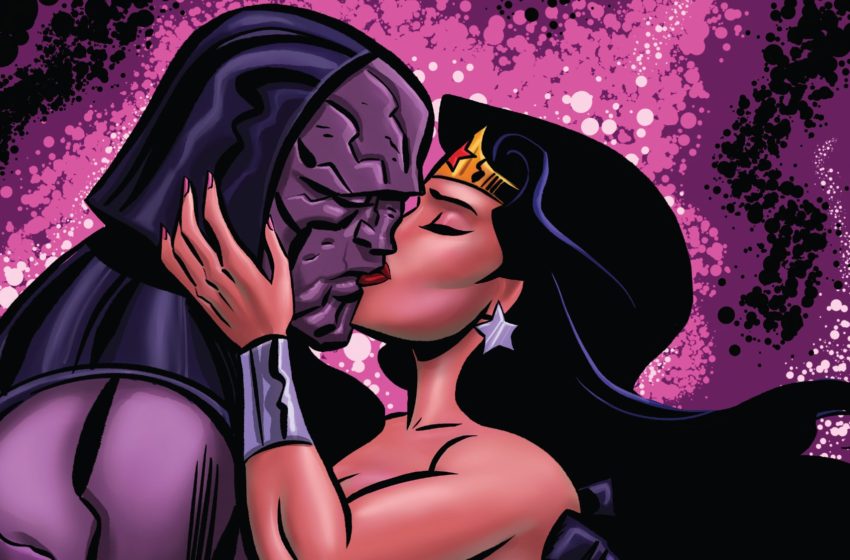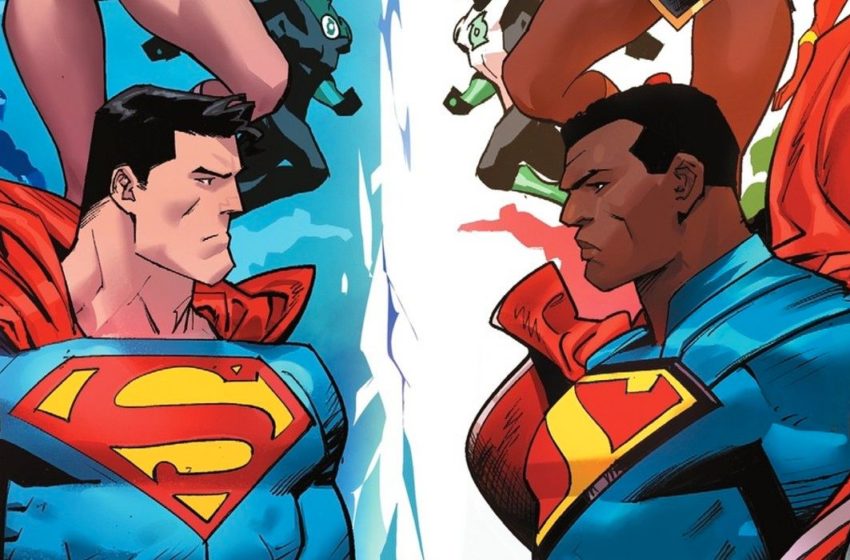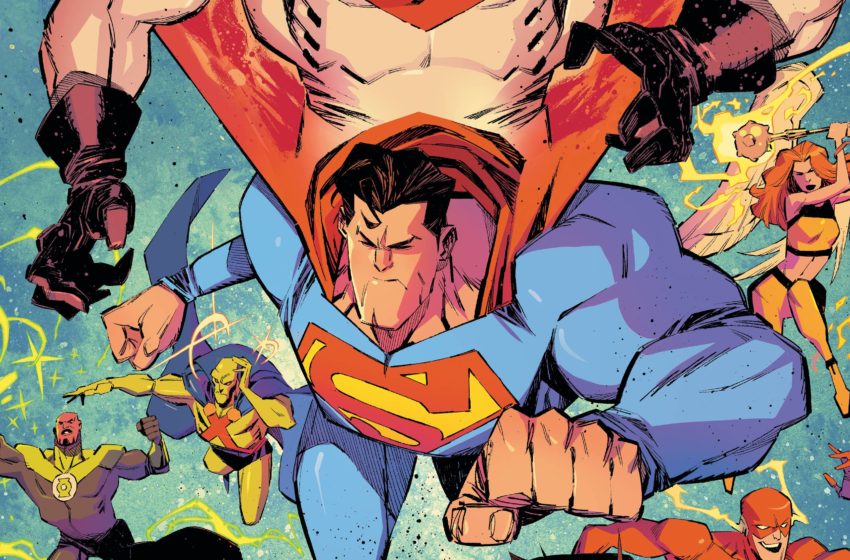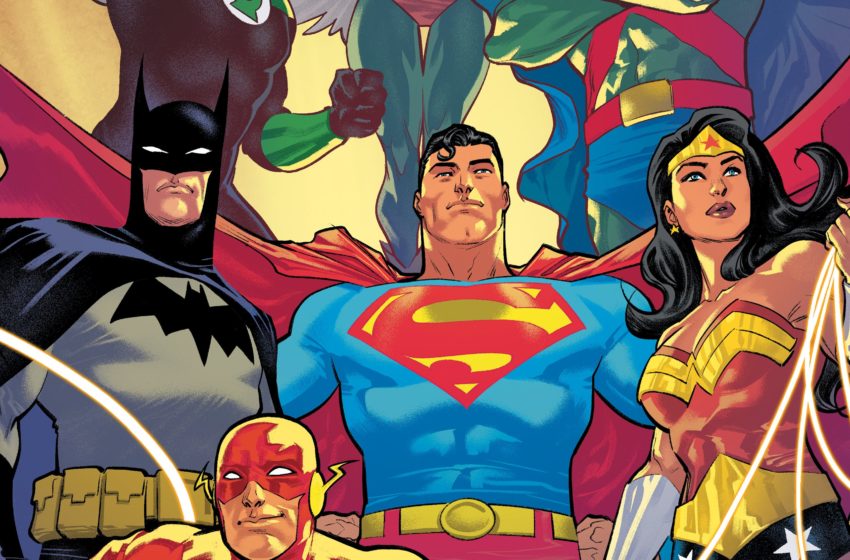The Multiverse is breaking, and heroes are being randomly scattered across unfamiliar universes. In one world, the Diana we know finds herself in a world destroyed by Darkseid – but how did it come to this? Justice League Infinity #4 is written by J.M. DeMatteis and James Tucker, drawn by Ethan Beavers, colored by Nick Filardi and lettered by DC Hopkins.
Justice League Infinity took a pretty big swing here. Not just going for an unlikely romance, but in the process trying to make Darkseid sympathetic, a being so evil he’s more than just a DC Universe villain – he’s an existential threat. It’s quite a challenge that the creative team set up for themselves, here.
They failed completely, but it’s still a pretty great comic.
Part of what makes this book so fun is that it’s not afraid to sell its melodrama with a completely straight face, despite ostensibly being a title for kids. A godlike entity’s existential crisis is tearing the fabric of reality apart, and in his desolation he continues to make things worse, apparently driven by the questions that plague him. It’s tragic, it’s intense, and it’s…just silly to not have to question it too much, to be able to take it at face value.
This week’s narrative captions are brought to you by Diana herself, as she narrates the story of her meeting with Darkseid in a universe destroyed by his ambitions. On this world, Darkseid and its Wonder Woman fell in love – but Darkseid was unable to resist the allure of the Anti-Life Equation, a malevolent entity that took control of him and ended all life in the universe but for Darkseid himself. Now Darkseid lives a tortured existence in the ashes of a world he’s responsible for destroying.
Were this any other DC villain – any at all – this story would work for me. But imagining Darkseid with anything approaching remorse, or even regret, seems like a wild mischaracterization to me. Aside from his unconvincing romance with Diana, his personality is barely modified from the Darkseid we know. There’s only so much disbelief that can be suspended, and when it can’t be held up any longer, that part of the story falls flat.
But just like our Diana, who distrusts Darkseid but is spellbound by his story, I find myself hooked by the telling of this – at least the flashback. Leave the romance aside, and this has the feeling of myth to it. A New God, obsessed with order, destruction, and power, whose hubris led him down the only path it ever could have gone. While the narrative captions haven’t always worked for me, they completely do here. The flashback montage, framed by Apokolips tech, all the reds and oranges of flames of doom, and everywhere, a Darkseid who refuses to believe he can’t have it all.
I also really enjoyed the brief callbacks to Wonder Woman’s possible relationship to Hades, a thread that the animated series never had a chance to fully explore. I don’t really care about whether or not Hades is her father – but I am interested in the feelings of doubt it brings up in Diana. The show explored the paradox of her as a pacifist warrior in interesting ways, and it’s something I always think of specifically for this version of her.
It’s not all a Wonder Woman story, though – the League gets a few pages themselves. Trapped in a multidimensional vortex threatening to tear them apart, their only hope lies in J’onn, who has bound the ship’s AI to his mind. J’onn’s mind is being torn apart by the crisis, but it’s the stoic Batman who is able to bring out the strength J’onn needs to pull himself together.
This is something I miss about the Justice League – they’re not just iconic heroes, but friends, who have been through the unimaginable together. They understand each other and know how to raise each other up when the chips are down. There’s also a moment that highlights Overman, watching this unfold, wondering just what goes though his mind at the sight of this, and it’s there that I realized what the hook of this series was for me beyond the simple fact that it brings back my faves from Justice League Unlimited.
The breaking of the multiverse – the cracking of the mirror, as the title calls it – makes a space for wild, poignant, weird and deeply charming superhero stories, all colored by the perspectives of superheroes I grew up with. I spoke of moments, in last issue’s review, and this issue just cements that thought. Forget the larger narrative of fixing the Multiverse – I really love that there’s a space that just doles out short but memorable tales of all the worlds that could be.
Some of them are just hints of grander stories. Some of them are stolen glimpses into a mind under psychic assault. Some of them get almost a full issue themselves, in a universe left for dead. Each tale, each moment only as long as it needs to be, each evoking the magic that the show brought to the screen.
Even when a story falls flat, there’s so much to enjoy about the telling of it. Justice League Infinity is my happy place, and I’m grateful that it exists. Now someone get poor Amazo a good book on philosophy.





